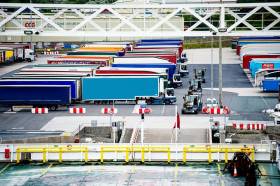Displaying items by tag: UK Trade
#Ports&Shipping - UK trade with continental Europe is likely to be gridlocked when Britain leaves the customs union without a fundamental rethink of English Channel roll-on roll-off (RoRo) services.
Peel Ports [a UK ports group incl. Liverpool] is calling on cargo owners, hauliers and others to look at two potential solutions to inevitable congestion at Dover, learning lessons from a model commonly used for Irish Sea freight and using capacity at ports across the country.
Stephen Carr, Commercial Director at Peel Ports, said: “The supply chain needs certainty, predictability and resilience but we all know about the acute delays and problems that already exist at Dover when there’s the slightest disruption to normal operations. There’s a growing realisation in the whole logistics community that we’re at a tipping point that will force traffic away from the Dover Straits.
“Businesses simply can’t take a huge gamble on what that post-Brexit world might look like, especially those with ‘just-in-time’ processes or that are shipping perishable goods. They need to take steps now to ensure they can deliver goods on time without incurring massive extra costs or compromising on quality. That is perfectly achievable by moving away from the fixation with Dover and by using unaccompanied trailers as many companies do already on the Irish Sea.”
Currently, more than 75% of all RoRo freight from ports on the near continent passes through the Dover Straits. The market is around 4 million units, of which 99% is transported by conventional means of a lorry driver with a cab and trailer.
This is in contrast to Irish Sea freight, where more than 50% of the cargo is only the trailers. In this model, goods are held as contingency stock at the port of entry, with trailers not leaving the port until up to 48 hours after their arrival in some circumstances. Such an approach would provide more time for border checks to take place without the pressure of them needing to be completed during a short sea crossing or at a congested border point.
Stephen Carr added: “Cargo owners and their supply chain providers typically need freight units to leave ports immediately on arrival or just 90 minutes after vessel departure from Calais. But there’s no certainty in the industry that this can be achieved reliably post-Brexit. Companies could look at creating stockpiles in UK warehouses that will allow them to meet business requirements in the event of any delays, but that results in long leases and increased road or rail mileage in diverting to warehouses, increased handling costs, and increased risk of damage to goods. Also, it’s not clear that such warehousing is available in sufficient supply or on flexible terms.
“The modelling that we’ve done shows that routing via ports such as London Medway is just as efficient as the existing options through the Dover Straits, as although the sea leg is longer road miles are reduced. Door to door cargo owners might actually save money, as well as avoiding congestion and reducing carbon emissions. Other benefits include improved productivity for hauliers as drivers do not to waste any time on the sea leg.”
The UK has around 30 major ports, the majority of which handle RoRo cargo. Although not all will have the docking facilities and land required at the moment, many could increase capacity to accommodate goods diverted away from delays at Dover. Peel Ports operates four ports with RoRo capabilities in London Medway (Kent), Liverpool, Clydeport and Heysham (Lancashire).
For more information on our Brexit solutions and to download our white paper click here.
























































